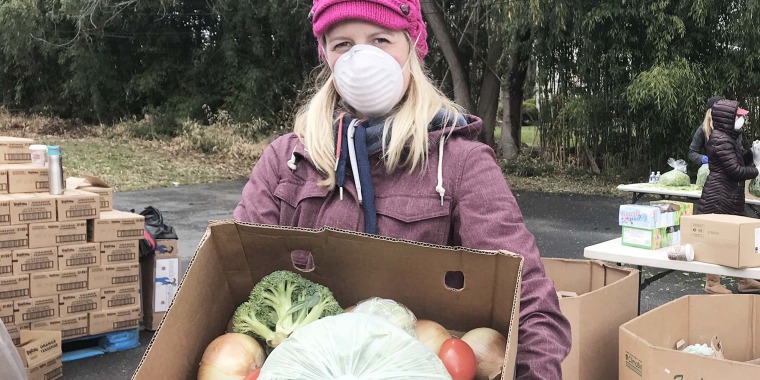With food pantries still struggling to keep up with the rise in demand during the coronavirus pandemic, several groups and individuals across the country are stepping in to help fight hunger.
From hunters to farmers and even a wedding planner, many are using their skills to help those in need.
Earlier this year, business nearly came to a halt for Kambria Sims, an event planner based in Florida. These days, she's found a new way to put her skills to good use. After all of her spring events were canceled or postponed, Sims decided to spend her free time helping Feeding Tampa Bay, a local nonprofit that provides food to families in need.
Sims first volunteered with the group four years ago and looked for additional ways to partner with them when she started her own event planning business, Happenings by Kambria, a year later. After organizing a wedding at the FTB warehouse in 2018, Sims began planning the group's annual Fork Fight gala, an event attended by 600 people, the following year.
"When COVID-19 hit, we were in the planning stages of Fork Fight 2020 that was to be held in May. The event was quickly postponed so the group could dedicate more time to the new need in the community," Sims told TODAY Food. "After just a few weeks, FTB realized they had a huge need for staff to help implement the new programs."
Using her industry connections and organizational skills, Sims quickly got to work growing the group's mega pantry programs in Hillsborough and Pinellas, then later expanded it into three more counties. On a daily basis, the Floridian oversees site visits, supplies and volunteers for the program, which now feeds 10,000 families a week with the help of 500 volunteers in five counties.
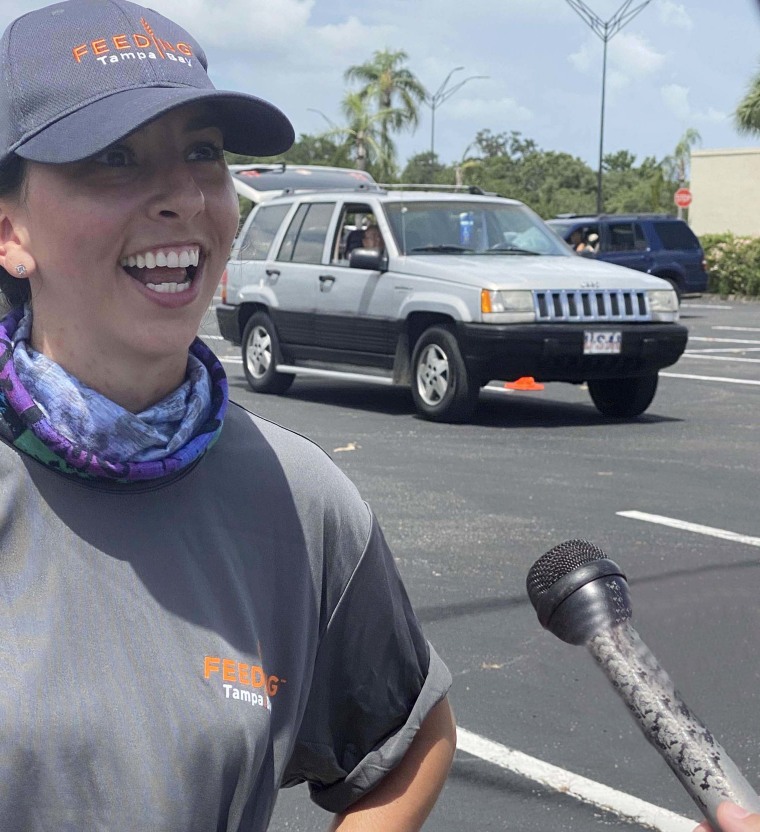
With her own industry in limbo during the pandemic, Sims said she is happy that she's been able to keep busy over the past few months.
"I can't imagine what I would be doing with my time or talents (right now) as so much of my industry's future is still unknown," she said. "I feel as if COVID-19 has caused so many problems in our community and country, and I feel blessed and thankful to be doing something that is productive and solution oriented."
Giving continues after the hunt
Since moving to Idaho in 2009, Jeff Schroeder has been actively involved with local food pantries and ministries. In 2013, he took on the role of Executive Director of Idaho Hunters Feeding the Hungry, a nonprofit organization that pays for the processing of surplus wild game meat that is then donated to food banks, soup kitchens and churches.
"Good quality protein is always a challenge for pantries to provide. Food banks (and) pantries get plenty of doughnuts donated, but very little good quality, red meat protein," he told TODAY.
When COVID-19 hit and families began quarantining at home in late March, IHFH witnessed the demand for food (and meat in particular) rapidly spike. His group is able to provide one-pound packages of processed wild game to families in need.
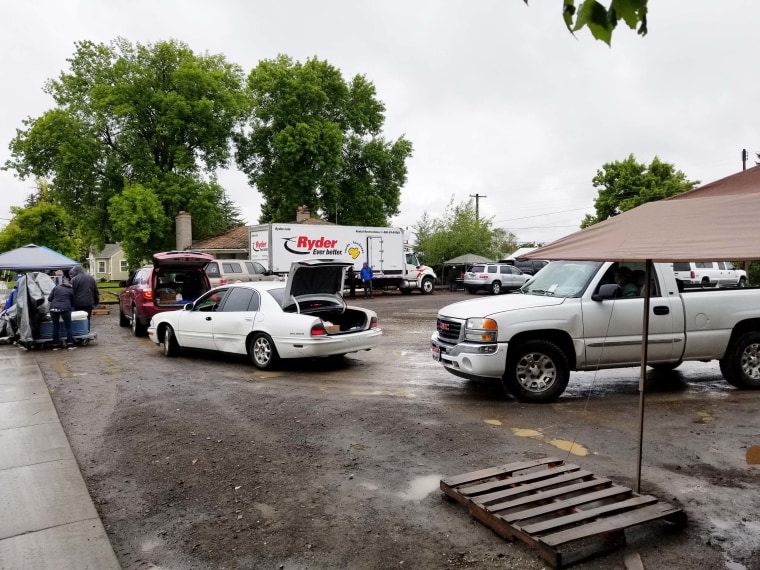
"For those that have not prepared wild game before they are, at times, reluctant to try it, but after tasting it, they are excited for more," Schroeder said. "Even more exciting are the seniors that relive past hunting memories when enjoying a meal. With the fluctuation of pricing and availability of meat, the timing for this has been a blessing."
Farmers are donating surplus crops
Since 1996, Farmers Against Hunger has been tackling food insecurity in New Jersey through its gleaning program. In conjunction with local farmers, the organization's volunteers harvest surplus produce from farms, wholesalers and distributors, then deliver it to hunger relief agencies and community organizations.
With an increasing number of families experiencing food insecurity due to the pandemic, the group has started to host direct-to-resident emergency distributions throughout the state.
"We received an upsurge of calls and messages asking for assistance, so we knew there was great need as a result of the increase in unemployment. We decided to think outside the box and try to get food to as many people as we could in a safe, socially distant way," Farmers Against Hunger Director of Programming and Outreach Elyse Yerrapathruni told TODAY.
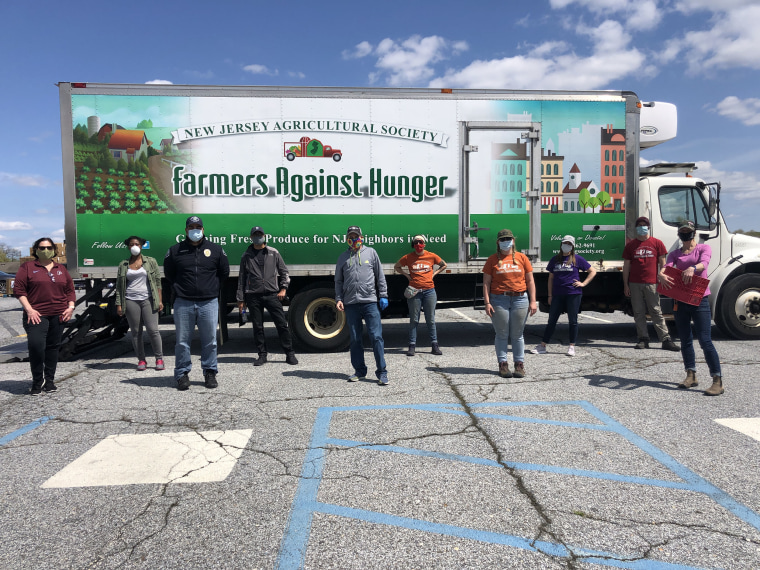
The group has distributed more than 1 million pounds of produce and milk to families in need across New Jersey over the last few months through its drive-up centers.
"Many families that have never experienced food-access issues now have to make tough choices between paying for food and paying for medical bills and housing. No one should have to make those choices," Yerrapathruni said.
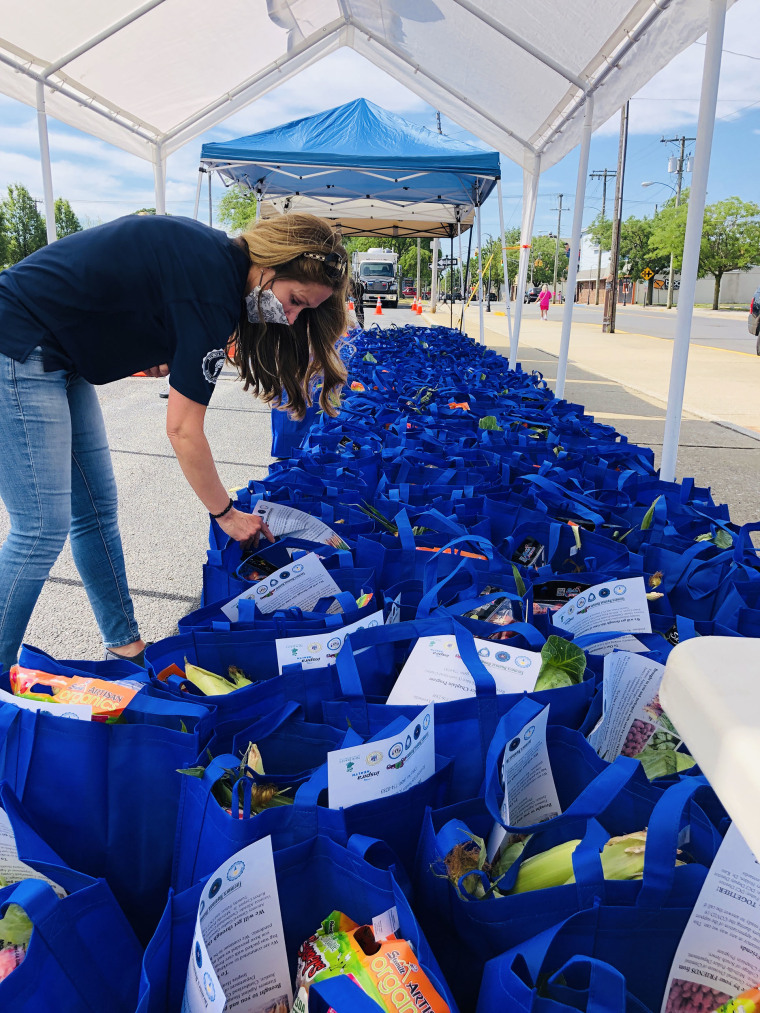
Since the pandemic began, Yerrapathruni said over 400 new volunteers have partnered with Farmers Against Hunger, but the need for food is growing every day.
"We have had distribution events where hundreds of cars have been in line for food. Many of the events have reached upwards of 1,000 families," Yerrapathruni said.
Members of the organization are grateful for the opportunity to give back, but also recognize that they have a long road ahead of them.
"This experience has been rewarding, but also truly heartbreaking," the program's director continued. "We have run out of produce at a couple of events because the need is that great. It is so difficult to tell someone that you ran out of food. It’s our mission to continue hosting distributions as long as there is need."
"Friendly Fridges" are popping up across New York
Nonprofit organizations aren't the only ones working to address hunger right now. After filling up one fridge with food and placing it in a Brooklyn neighborhood for community members in need, New Yorker Thadeus Umpster helped spark the free community fridge movement — they're now known as "Friendly Fridges."
Local volunteers have been filling and cleaning the fridges regularly and anyone is allowed to take what they need on a daily basis. There are now 38 fridges in the New York area. Fridge operators stay in contact with each other about how to distribute produce, generate awareness and take care of the fridges.
When Bronx residents Sara Allen and Selma Raven heard about the movement in May, the couple started their own Friendly Fridge after finding a used one on Craigslist. To get started, they asked local bodegas if they could plug the appliance into their outdoor outlets.
Raven's son died seven years ago, and this has been a particularly meaningful endeavor for her.
"Michael (her son) was very passionate about access to healthy food and advocated relentlessly for fresh produce to be available in food desserts," Allen told TODAY.
Raven, a special education itinerary teacher, and Allen, an analytics architect, have been overwhelmed by the positive response to their local fridge and are thrilled to see community members embracing the project.
"Two young men, Ben and Zach, embarked on a sandwich challenge and put together 115 wrapped and labelled sandwiches. They put them into two large trays and brought them to the fridge and the sandwiches were gone within two days," Allen said. "One woman regularly collects cartons of milk from various places that are not using them and brings them to the fridge. Those go almost immediately as well."
Local businesses are also lending their support. One bodega down the street from their fridge drops off buttered rolls almost every other day, while staff members from the Peruvian restaurant Claudy's Kitchen bring wrapped empanadas at night after closing. After their first fridge broke, New Jersey-based Yudin's Appliances even donated a new fridge to Allen and Raven.
Said Allen, "The project has given us both a way to continuously help our community in a sustainable manner and we are both super excited for more opportunities to grow this initiative into far reaching corners."
